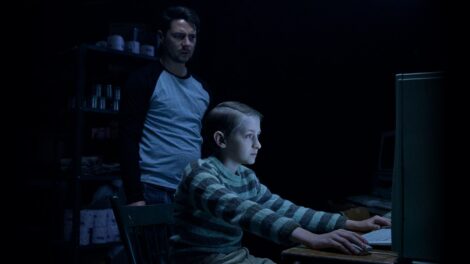Twitter. That’s scary enough on its own isn’t it? Throughout the years, Twitter has proven itself to be a platform containing some of the most unspeakable horrors of our lifetime. Perhaps one of the most memorable instances of Twitter-based terror is cartoonist Adam Ellis’ 2017 thread documenting his purported haunting by a young boy with a misshapen head. A thread that came to be known as DEAR DAVID. The thread on its own is absolutely terrifying and rereading it in preparation for the film version left me covered in goosebumps and sleeping with the light on. After the success of ZOLA in 2020, it is no longer a far fetched idea that a Twitter thread can serve as legitimate source material for a film adaptation, but in the case of DEAR DAVID, we may be left wondering if a film version really is the end all be all form of media to tell this specific story.
DEAR DAVID begins with some very brief backstory on the titular David. The year is 1996, it’s the dawn of the Internet and young David (Cameron Nicoll) is enamored with his computer. It’s more of a love-hate relationship as we witness the boy being mercilessly taunted by faceless trolls in a chatroom in what may be the first ever documented case of cyberbullying. Interestingly, this set up suggests that the desire to be cruel online under the guise of anonymity is something innate to human nature rather than a learned behavior, demonstrating that as long as there has been the Internet, there have been trolls. At its most nuanced, DEAR DAVID touches on several of these more esoteric approaches to the Internet as we know it today, and at its most reductive, it’s another in a long line of “technology bad,” movies.
After being launched into the present, or rather 2017, we are introduced to Adam (Augustus Prew) himself. Similarly to David before him, he is glued to his technology, locked into his phone and his Twitter feed. Some of that is related to his work at Buzzfeed, but what feels like a larger portion of his involvement with the Internet centers around him engaging with cruel comments on his comics. Unfortunately, he is oftentimes also a very unlikable character, swiftly demonstrating cruelty to his friends and a disinterest in his boyfriend that makes it difficult to root for him. There is certainly a time and place for a good anti-hero, but the struggle to latch onto a sympathetic protagonist does the story of DEAR DAVID a disservice.
Adam has a lot going on before the haunting even begins. His Buzzfeed boss (played by the ever excellent Justin Long) is really putting the pressure on him to come up with something attention grabbing and newsworthy, to get people talking about the site. He is also experiencing a strain in his relationship with his boyfriend (Rene Escobar Jr.) as he is preparing for a trip to visit his mother who is undergoing surgery. Luckily, once a ghostly boy with a dented head starts visiting Adam in his dreams, he starts posting the DEAR DAVID thread, which offers just the boost in traffic to Buzzfeed that his boss had been hoping for. As successful as the thread is, DEAR DAVID effectively demonstrates how one cruel comment can stick with you so much more than a hundred positive comments can. It also highlights the cycle of abuse that sort of online interaction can create. Someone with a faceless profile is mean to you, so you’re mean right back and it goes on and on, adding fuel to that particular fire. 140 characters is not always the appropriate format for nuance and understanding.

It’s this exact hatred and lack of nuance that the specter in DEAR DAVID latches onto, punishing Adam for sinking to the level of Internet trolls. This seems to be an inevitable side effect of engaging with the Internet in this world; you have no choice but to become as viscous as everybody else is. If this is the thesis statement of DEAR DAVID—that people on the Internet are mean—it requires a really fresh, unique, and inspired way of looking at this idea, because it’s something that’s already been said so many times before. The Internet has become a necessity in the modern world. Solving the problem of online cruelty is truly not as simple as touching grass or putting down the phone or loving yourself enough to make the demons go away. It would have been interesting to see DEAR DAVID go beyond that.
With DEAR DAVID, we are given so many glimpses of interesting ideas and thought experiments, but we aren’t given the time to fully investigate them. The audience is offered passing thoughts of how we turn to the nebulous void of the Internet when we’re feeling isolated or unwanted, how we can view people as characters who only live in our screens rather than the fully realized human beings that they are, and how the Internet can rapidly create a hive mind. With nothing to anchor these ideas or tie them all together, they remain loose threads, muddying the message DEAR DAVID is trying to convey.
There is a world in which this film adaptation of DEAR DAVID works, with all of its complex ideas and legitimate scares, but unfortunately this just isn’t it yet. So much backstory and inward psychological upheaval was added to the story to enhance it and raise the stakes for a feature length, but much of it simply falls flat. Perhaps DEAR DAVID is a story that didn’t need embellishment. Maybe it was best and most effectively told exactly as it happened, a months-long Twitter saga playing out in real time, leaving people on the edge of their seats waiting for the next update. It was thrilling, engaging, and bone chilling, everything a good horror story needs. If it’s been a few years since you’ve read the thread, it is well worth a revisit.
Tags: Adam Ellis, Andrea Bang, Augustus Prew, Buzzfeed, Cameron Nicoll, Dear David, Evan Turner, John McPhail, Justin Long, Lionsgate Films, Mike Van Waes, Now on VOD, Rene Escobar Jr., Twitter, vod



No Comments